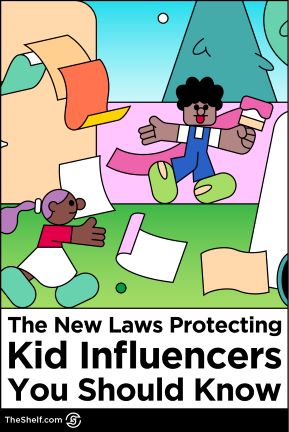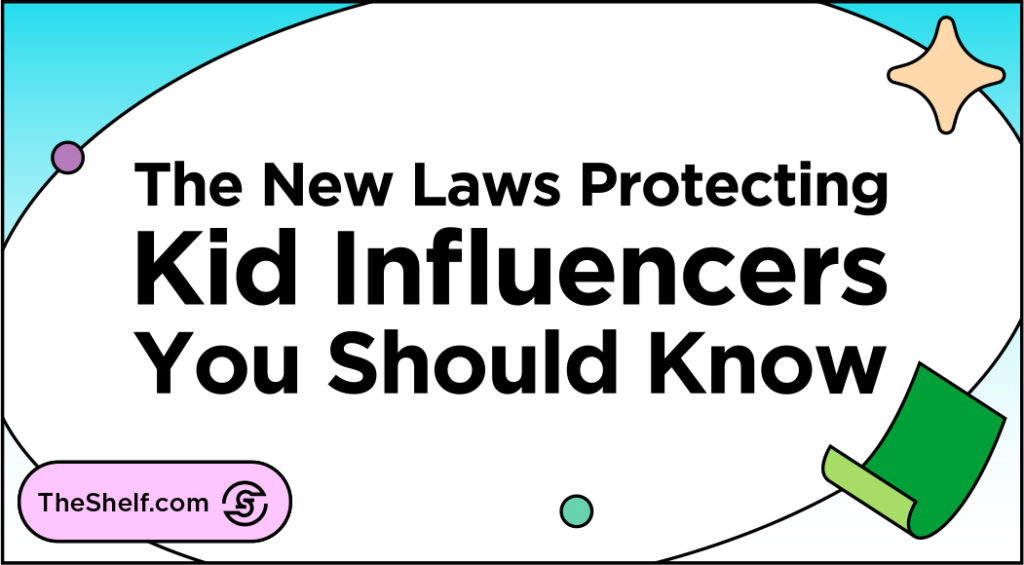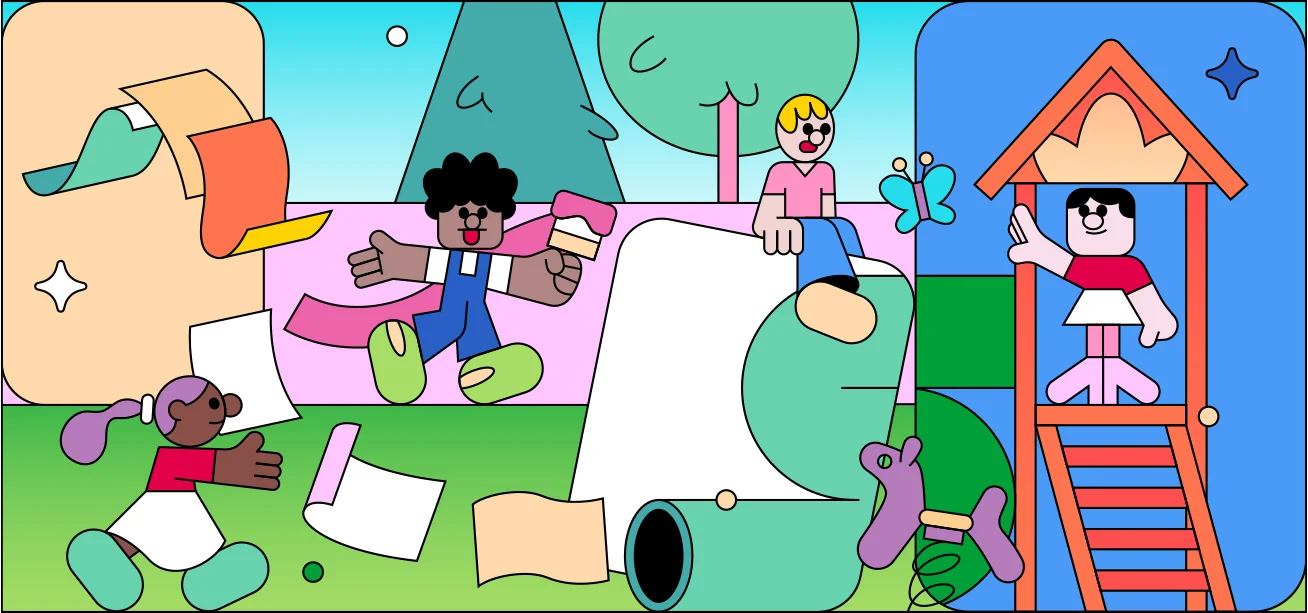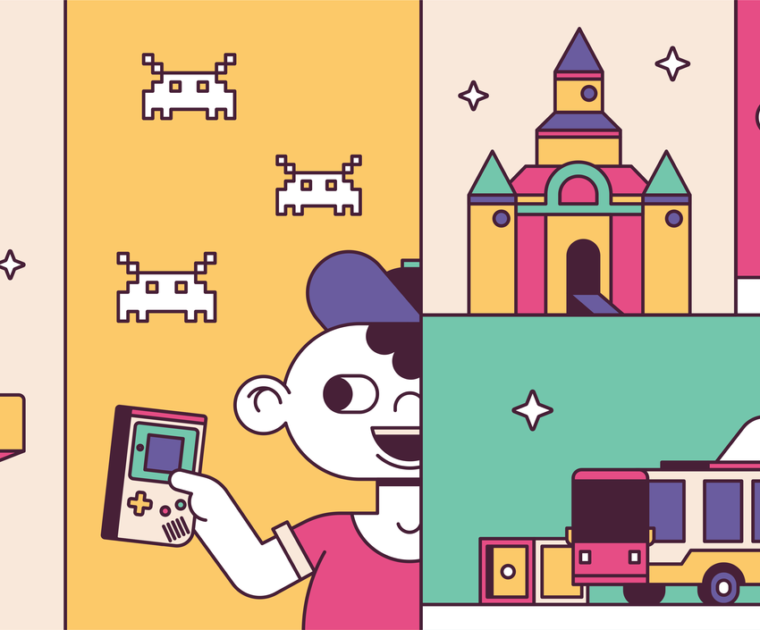Kid influencers, or kidfluencers, deserve protection. Unfortunately, that protection has not been implicit for all kidfluencers. Enter: new kid influencer laws.
We love a cute kiddo video as much as the next scroller. But entertainment value should never supersede the rights and well-being of children. Unfortunately, as social media has rapidly ballooned to unwieldy popularity, it’s taken a while for influencer laws specifically protecting kidfluencers from exploitation to catch up. Luckily, there is legislation on the books. Some of which will likely go into effect this year.
The Importance of Kidfluencer Laws

I’m going to give it to you straight. This is somewhat of a heavy post. But it’s an incredibly necessary one. Many of the children who inspired these laws were taken advantage of, often by their own parents, for the sake of profit. We are talking about child labor here, after all.
Of course, brands do not have the same responsibilities as parents. But if your brand is hoping to work with mommy and daddy bloggers or any kind of kid influencer accounts, it’s important you do so with the utmost care.
We’ve outlined the basics of kid influencer laws below, but this is a developing issue. As the influencer marketing industry continues to grow and change, we expect legislation protecting kid influencers to follow suit. Hopefully sooner rather than later.
Read on to explore the ins and outs of child influencer concerns and the recent laws proposed to address them.
Who Is Considered a Child Influencer?
Kid influencers are those under the age of 18 who have a presence and following on social media. Although, some new kid influencer laws recognize child influencers as those who are age 16 or younger. Essentially, they are influencers who are also children. They have (often large) followings, post about their lives, hobbies, or a specific niche, and work with brands through sponsorships.
Most major social media platforms, including Instagram, TikTok, Facebook, and X (formerly Twitter), require users to be 13 or older to sign up for an account. We all know kid influencers below the age of 13 exist. Most often, a parent or family member runs the account and posts the content of kidfluencers younger than 13.
It’s important to remember that being an influencer is a job. Creating and posting influencer content in conjunction with a brand in exchange for funds, goods, or services is a form of labor. Kid influencing is a form of child labor.
Working children have been in the public eye for generations. Whether they were Gerber Babies, Disney Channel Stars, or Shirley Temple, chances are you’ve been entertained by a kid on the clock. While there are legal issues and protections for kid actors, there has not always been legislation for child influencers.
The Ethical Concerns with Kidfluencing
Until recently, child influencers have been afforded few protections. Yet there is a lot to consider when it comes to labor laws, privacy, and compensation. Not to mention the lasting impact these public images may have on children as they grow, leave home, and eventually lead adult lives.
CHILD LABOR
Because influencer marketing is such a lucrative industry and kid-centered content is so popular, many families are drawn into the world of child influencing. The allure of making millions of dollars by simply documenting your family’s life and your child’s development is understandable. But it results in some children being documented and displayed publicly to thousands of people from the moment of their birth.
Obviously, an infant cannot consent to the use of their likeness and experiences for monetary gain. Neither can more developed children. Though some kids may enjoy their influencing duties, they are hardly able to make an informed decision on the use of the content created. The legal age of autonomy in the United States is 18. Before then, children are not considered mature enough to make adult decisions (such as those related to healthcare and voting). Therefore, it is most often the parents who have final decision-making power over what and how much is shared of the child’s life.
Many successful kidfluencer accounts feature daily or weekly vlogs that detail the family’s life. This could mean daily work is required of a child in order to produce regular content. Yet most states have no regulations protecting kid influencers from long hours.
PRIVACY
Some kid influencers have their meltdowns, bad grades, first periods, and medical issues documented and distributed to the public. Every U.S. citizen has a right to privacy. So where does the child’s ability to consent to these posts begin and end?
While content uploaded to the internet is still subject to copyright, it becomes easily accessible to the public and nearly impossible to scrub entirely from the web, even if it is taken down at a later date. This means that content of child influencers could follow them for the rest of their lives. Even if the original post was deleted.
There are also concerns with predators’ accessibility to child influencers’ image and likeness. As concerns around AI-generated content and deep fakes grow, child influencers are at risk of having innocent images altered and distributed on the dark web. Unfortunately, kid influencers’ fame, reach, and abundance of public-facing images also puts them at a higher risk of being targeted by groomers and sexual predators online.
COMPENSATION
While parents cash in on their children’s influencer marketing success, few protections guarantee any of the earnings for the child’s labor actually go to the child. Kids can work their whole young lives, without properly consenting to the labor, and not see a dime of their earnings when they turn 18. Many of the new laws we’ll detail below set out to remedy these compensation issues. Kid influencers deserve fair pay for their work.
Child influencers are already at a high risk of exploitation. Unfortunately, sometimes the exploitation call comes from inside the house. Parents can rack in the big bucks on the backs of their children without having to pay them. And up until recently, it was legally kosher. (In some states, it still is.) We don’t have to spell it out for you. Being forced to work for years without pay is obviously not good.
LASTING IMPACT
Child influencing is a relatively new concept, rising in the early 2010s with Instagram and YouTube. So it’s difficult to predict the long-term effects this public sharing will have on kidfluencers as they mature. The first kid influencers are only now entering adulthood. Some child influencers have come forward and told their stories. But there isn’t much data on the overall impact this profession has on kids’ future lives. Experts have reason to believe, however, that in some circumstances, child influencing can cause serious harm.
Growing up is hard enough without being thrust into the public eye. It’s hard to believe spending your childhood, warts and all, in front of thousands, if not millions, of strangers on the internet would be without consequence. There are concerns that early fame, the pressures of being a role model to thousands at an early age, and the unforgiving nature of social media will take a real toll on kids’ mental health.

New Kid Influencer Laws to Note
As of this writing, it is legal in 49 states for child influencers to be the subject of content that earns their parents millions of dollars without the children themselves being entitled to a dime. The one state where it’s no longer legal? Illinois.
In August of last year, Illinois passed groundbreaking legislation that guarantees partial compensation for child influencers younger than 16 years of age. According to Teen Vogue, the legislation says kid influencers are entitled to “at least 30 percent of the [adult vlogger’s] compensated video content…[which] included the likeness, name, or photograph of the minor.” That is if the content meets a certain monetization threshold.
STATES FOLLOWING SUIT
In the past few months, six other states have introduced legislation that mirrors the Illinois ruling. These include Maryland, California, Georgia, Missouri, and Ohio. The Maryland legislation also addresses privacy protections and “the right to be forgotten.” Essentially, kids have a right not to have a record of certain personal information.
The California legislation would require creators to allocate a proportionate percentage of their earnings to child influencers if they appear in 30 percent of their content or more. Democratic Senator Steve Padilla is hoping to lead the nation in laws protecting kidfluencers, just as the state had to establish protections for child actors.
In Georgia, the legislation dictates at least 15 percent of gross earnings go to child influencers if they appear in a certain percentage of an account’s content.
The Missouri legislation takes things a step further. It ensures child influencers earn at least half the wages of the content they are in. And they’d have an added privacy right to deletion. Basically, once they turn 18 they’d have the option to curate and delete content. If passed, child influencers who reach 18 without their proper earnings set aside would have the ability to sue their parents.
The proposed Kidfluencer Protection Act in Ohio takes a similar approach to the right to deletion. It also guarantees a certain percentage of funds go to the child influencer based on the usage of their likeness in the monetized content.
Several of the states’ legislation dictates that child influencers’ earnings be held in a trust until they turn 18.
Stay Up to Date on Kid Influencer Laws
We hope this provided some clarity on the most recent developments in kid influencer laws. The world of influencer marketing should be creative, accessible, and fundamentally built on trust. That is predicated on fair and just treatment for all parties. The Shelf does not condone any influencer marketing built on the exploitation of influencers, especially minors.
As brands, marketers, and fellow humans, we have a responsibility to protect the next generation. These digital natives will have access to the internet and social media far longer than any of us reading this post have. The laws outlined above aim to protect them from greed, exploitation, and abuse. After all, no amount of ROI is worth the cost of a child’s well-being.
If you’re hoping to ethically work with kid influencers and you’d like help creating a campaign, we can help! We hope this post did not scare you away from working with mommy and daddy bloggers or child influencers. There are plenty of families who strike a healthy, legally abiding balance in the content they create with their children. Our experts at The Shelf can help you find families and kid influencers who fit your brand, niche, and needs. Schedule a strategy call with us today, and we’ll start talking strategy.

About This Author
Ariana Newhouse | B2B Writer
I am a freelance writer and comedian based in Los Angeles. While making people laugh is my jam, it’s not always the company brand. So, I strive to make people feel something. My writing philosophy is collaborative, empathetic, and humanistic. At the end of the day, no matter the message, there are real people on both ends of the process.




